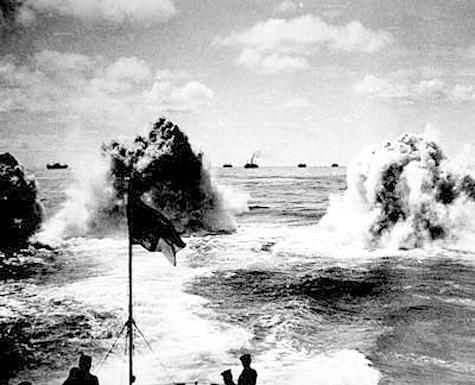On the evening of September 17, German U-boat 29 under the command of Commander Otto Schuart fired three torpedoes at the HMS Courageous. Within fifteen minutes the Courageous sank taking with it its captain and 518 men.
On October 13th Lieutenant Gunter Prien commanding U-boat 47 successfully entered into the British naval base at Scapa Flow. There he was able to attack the British battleship Royal Oak. He first fired four torpedoes at the battleship.; Only one hit, that one doing most of its damage above the waterline. Prien returned to fire three more torpedoes. One of them causing a catastrophic explosion sinking the Royal Oak and 833 men in fifteen minutes.
The period between July and October 1940 became know as the “Happy Time” for German submarines. During this period the wolf pact, a group of submarines operating together on a convoy, became operational. U-boats reached an outstanding 217 ships sunk representing more then a million tons of shipping, losing only six U boats.
1941 saw the tide of U-Boat activities shift temporarily. The use of additional escorts, air patrols, and US convoying of ships halfway across the Atlantic significanly cut down U-Boat losses. The period that followed the American entry into the war however temporarily changed this. Suddenly there were hundreds of unescorted vessels off the coasts of the US all silohetted nicely against the lights of US cities.
By early 1943 the tide tunred decisively agaisnt the U Boats, The allies had 500 escorts at there dsiposal, they were intercepting U Boat radio communications, and the introducation of escort carriers allowed uniterrupted air coverage for convoy across the Atlantic. Thus by mid 1944 one U boat was being lost for every allied ship sunk. The war in the Atlantic would go on, but victory was in the hands of the Allies.
German forces invaded Norway and Denmark. Oslo, Bergen, Trondheim, Stavanger and Naravik were rapidly taken. Navarik was retaken by a British force, but the British were soon forced to withdraw from the town.
By the end of the month, the Germans had broken the stiff Norwegian opposition, and the Norwegians were forced to surrender.
In a flanking move that made the French Maginot Line irrelevant, the Germans attacked the low countries. The Netherlands surrendered in four days, after massive German attacks on Rotterdam.
The Germans quickly drove into Northern France, dividing the French and British forces into two.
The British successfully extricated 200,000 British and 100,000 French troops from the beaches of Dunkirk. The troops were stranded in Northern France, cut off by the sweeping German victories. The British and French troops were forced to abandon their equipment, but their soldiers were available to fight another day.
The Germans attempted to subdue Great Britain by utilizing air attacks. Germany attacked all major cities and military installations. British preparedness, combined with the valor of its pilots and a new weapon called "radar," forced the Germans to pay a heavy price for their bombing. By the end of October, when the winter weather made the threat of invasion unlikely, the Germans had lost 2,375 planes, compared to 800 British planes lost.
British troops launched a surprise attack on Italian troops, which occupied parts of western Egypt. The British routed the Italians. On January 5th, the Italian garrison at Bardia– with 25,000 troops– surrendered.
By the end of January, the British captured Tobruk and, in early February, captured Bengasi and liberated Ethiopia. In April, German reinforcements, under the command of General Rommel, arrived in Africa and stopped the British advance. The British were forced to withdraw.
The first major naval campaign of Word War II, took place when the British navy pursued the Graf Spee, a German battlecruiser who was on a mission to attack British merchant vessels. Between September 30 and December 7 1939 the Graf Spee, under the command of Captain Hans Langsdorff sunk nine cargo ships with a total tonnage of 50,089. Not a single crewmen or passenger on any of the sunk vessels was killed.
The British navy correctly deduced that the Graf Spee would next head for the area off of Montevideo to intercept more shipping. A British task force composed of the cruisers Ajax, Achilles and Exeter converged on Graf Spree. On the morning of December 12, 1939 the found the Graf Spree. The Graf Spee opened fire first, damaging the Exeter. All three British troops responded. The British ships responded. In the ensuing battle both the British ships and the Graf Spee were damaged, but the cumulative effect of three British ships damaged the Graf Spee severely. The Graf Spee headed for Montevideo requesting time for repairs. The Uruguayans refused, while the British rushed additional forces toward Montevideo. Captain Langsdorff then decided to scuttle the Graf Spee in Montevideo harbor.
Text Source: History Central













































0 Comments:
Post a Comment